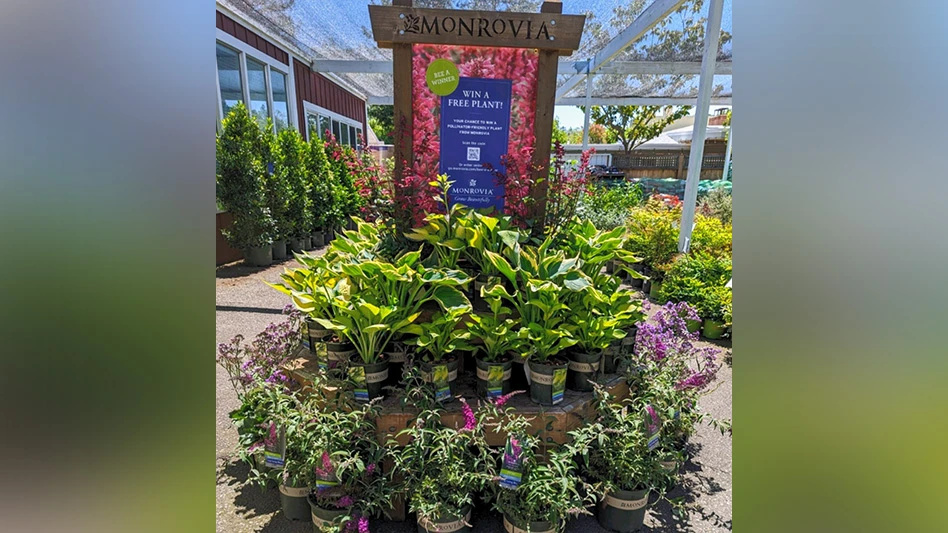
No good deed goes unnoticed at Greenscape Gardens. A sincere appreciation for customers and the community has earned them a loyal following, a good name and some great marketing strategies. The independent garden center in Manchester, Mo. is deeply involved in all kinds of causes from the local food movement to Relay for Life to school fundraisers. And while it’s all done for the right reasons, the cause-based marketing helps bring people through the door.
“We’ve pretty much built our business on community involvement, trying to make our customers feel like they’re a part of the success of their local business,” said General Manager Jennifer Schamber. “People take pride in knowing this store was built because of the community.”
Greenscape believes so strongly in community-based marketing that volunteer efforts are included right in the marketing budget. Staff and management get to volunteer and help out on company time, which gives them not only a sense of camaraderie, but a sense of purpose.
“Aside from just having it be something that customers recognize us for, it also gives the employees a sense of pride knowing that they’re a part of it too,” Schamber said. “And it goes a long way when you have people on board that believe in it. That’s where it really makes the biggest difference.”
 The chef grills up a feast for Greenscape Gardens customers over Memorial Day weekend to help with medical costs for a beloved local police officer. The chef grills up a feast for Greenscape Gardens customers over Memorial Day weekend to help with medical costs for a beloved local police officer. |
Stand out in the crowd. Community engagement really helps Greenscape make an impression — and it has to. Not only does the IGCs have a lot of competition from big box stores, it’s located on ‘Nursery Row,’ alongside several other garden stores. But it’s the chain stores that are their biggest competitors.
While big box stores can use loss leaders and other techniques to get customers in the door, Greenscape focuses on creating repeat customers by offering the best value and service around. Although the plants at a box store might cost less, shoppers won’t find the same kind of quality or expert help they can find at an IGC. “If you can somehow get them in here in the first place using any of these sorts of buy local marketing strategies, that’s great,” Schamber said. “When you get them in here and get them to understand that we’re not more expensive and you can get a bigger plant for the same price, and you can get a better plant for the same price. Once they see that, they’re sold.”
To get potential customers through the door, nothing beats a fundraiser or a community event for Greenscape. The extremely successful Flower Voucher program is a new take on the traditional plant sale that supports charity endeavors. Greenscape sells $15 vouchers to groups like women’s group P.E.O. at a discount, and the organizations sell them from there, using the profits for various projects.
T he program brings lots of new faces to the garden center and provides a boost of cash to help pull them into the spring season. “The best part about it is that people come in with their voucher worth $15, but they never spend just $15,” Schamber said. “Once we get them in here, the average sale is going to be somewhere in the $60 to $70 range. It also brings in a lot of new people and, somehow, not all of the vouchers get redeemed. There’s just nothing bad about doing the program. It’s the best free marketing you could ever possibly have.”
he program brings lots of new faces to the garden center and provides a boost of cash to help pull them into the spring season. “The best part about it is that people come in with their voucher worth $15, but they never spend just $15,” Schamber said. “Once we get them in here, the average sale is going to be somewhere in the $60 to $70 range. It also brings in a lot of new people and, somehow, not all of the vouchers get redeemed. There’s just nothing bad about doing the program. It’s the best free marketing you could ever possibly have.”
P.E.O. also helps out with the word-of-mouth marketing. The group is made up of hundreds of women, and a good standing can mean a lot when it comes to sales.
Make the most of a community project. The key to a successful community project is choosing something local that people can really connect to. For nearly 20 years, Greenscape has hosted a Memorial Day barbeque to raise money for a local cause, often just one or two people. The event has benefitted a former Greenscape employee injured in Iraq, two victims of the Joplin, Mo. tornado and a well-loved local police officer recovering from brain surgery.
“You like to try to do a little something for everyone, but you can’t,” Schamber said. “You have to choose what’s most important, so with our annual barbeque, we have it benefit something very relevant to something going on at that time.”
Greenscape employees have also volunteered their time and talents with outside projects like Habitat for Humanity. The big name recognition was great for Greenscape, who provided all of the landscaping on a 27-home project in St. Louis. Since the homes were LEED certified, all of the plants had to be low-maintenance and local, giving the garden center a chance to promote their native plant program.
For garden centers looking to get involved in a project, or just raise awareness in the community, the key is to choose something close to home to you and make it your own. “You have to pick what you believe in, first of all,” Schamber said. “You can easily get roped into anything so my best word of advice is to pick something near and dear, and own it.
A great place to start is the local schools, which always garner a great response, Schamber said. But even the best efforts will fail if there isn’t heart behind it.
“If someone isn’t already doing something, they’re really missing out,” Schamber said. “But again, it’s something you have to believe in. If you’re just jumping on board to something and you don’t own it, then don’t do it. It needs to be authentic.”

Explore the June 2012 Issue
Check out more from this issue and find your next story to read.
Latest from Garden Center
- This Florida garden center's busiest days are in the fall, not spring. Find out how they do it
- Terra Nova Nurseries releases new agastache variety, 'Peach Pearl'
- The Certified Shopify Online Garden Center provides local retailers with ecommerce tool
- Meet the All-America Selections AAS winners for 2025
- Endless Summer hydrangeas and Suntory Senetti glam up Grammys red carpet
- Ball Seed releases 2025 edition of 'Thrive and Flourish' for landscape and garden retail
- American Floral Endowment's Fred C. Gloeckner Foundation Research Fund accepting grant proposals
- Floral Marketing Fund and CalFlowers partner to advance floral industry





